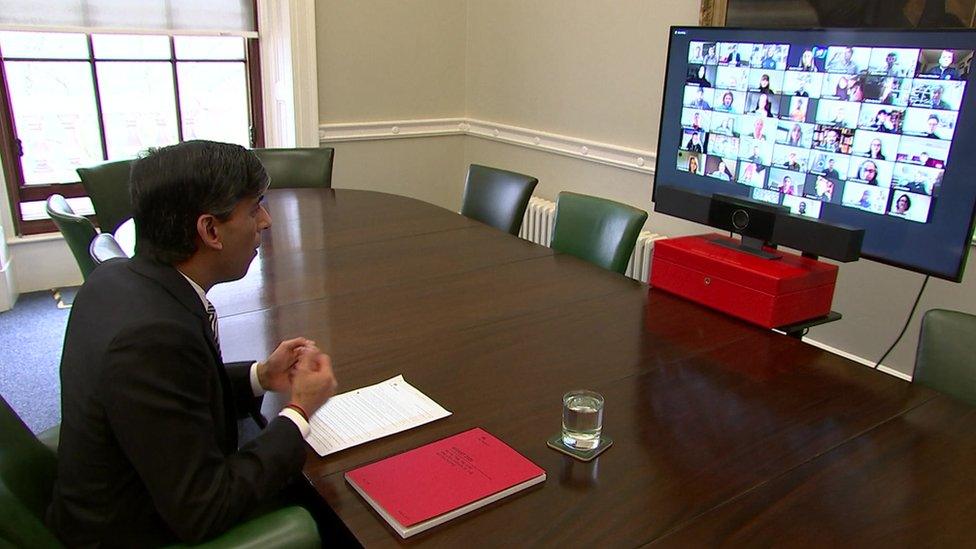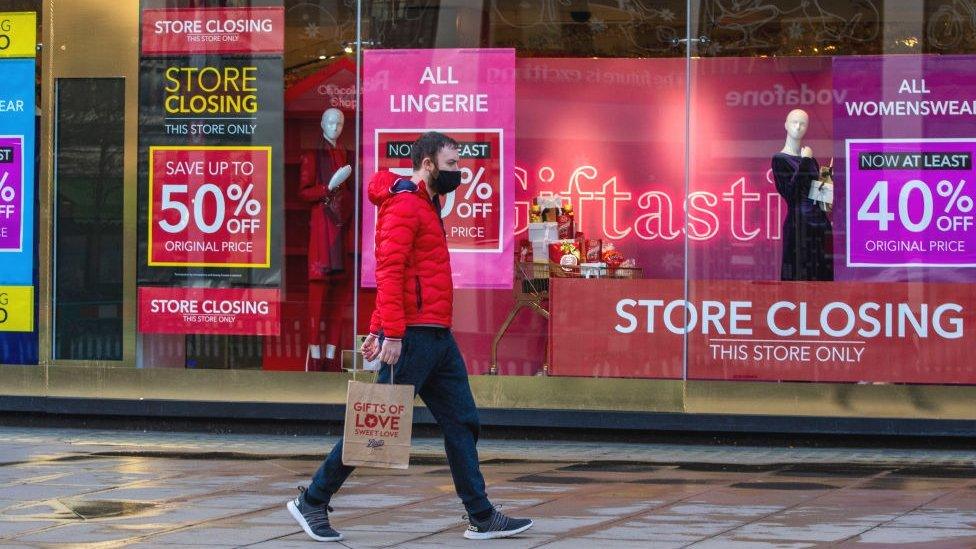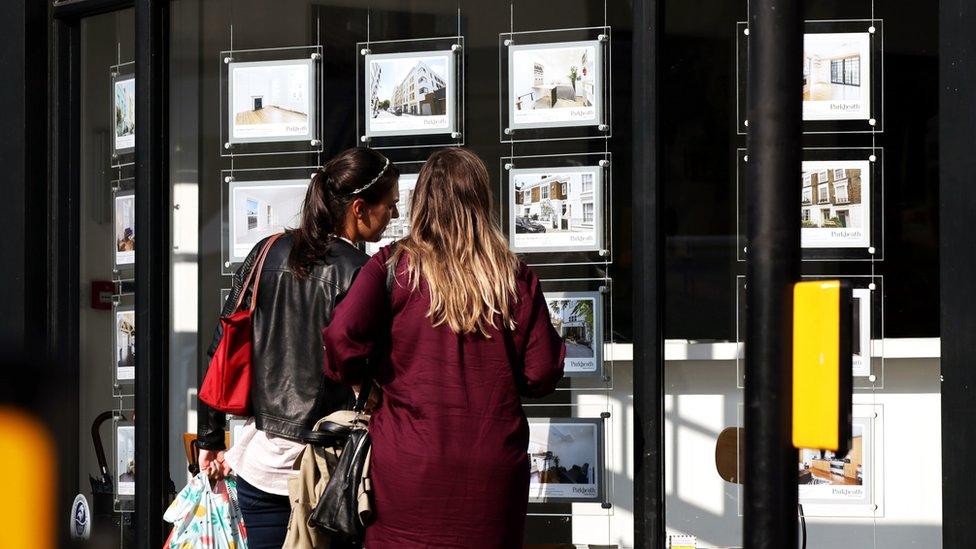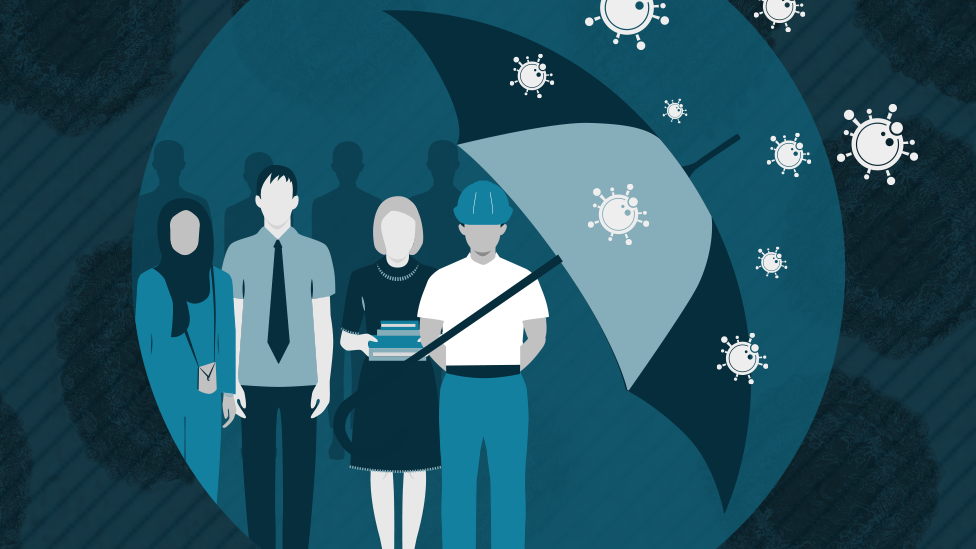Budget 2021: Furlough set to be extended - Kwasi Kwarteng
- Published
- comments
Kwarteng: Chancellor to extend furlough scheme
Business support including furlough and the VAT cut for hospitality firms will continue "while lockdown persists", the business secretary has said.
With Covid-19 restrictions set to end by June at the earliest, Kwasi Kwarteng told the BBC it was important not to "crush" any potential recovery.
Ahead of Wednesday's Budget, Rishi Sunak said he would protect jobs using the "full firepower" at his disposal.
But he also promised honesty about his plans to "fix" the public finances.
He faces a potential row with some Conservative MPs if he imposes tax increases, amid warnings they could stifle economic growth. And Labour is urging him to abandon planned council tax rises in England.
In his Budget statement, which is due to get under way at around 12.30 GMT on Wednesday, the chancellor will commit the government to doing "whatever it takes to support the British people and businesses through this moment of crisis".
He is set to extend the £20-a-week top up to universal credit for six months to help struggling households, a government source told the BBC.

The chancellor spoke to people who have benefitted from government schemes to support employment from the Treasury
Other support is expected to include:
£408m for museums, theatres and galleries in England to help them reopen when Covid restrictions ease
£150m to help communities take over pubs in danger of closing
£300m summer sports recovery package, including cash for English cricket
He is also expected to set out his plans to tackle the huge hole in the government's balance sheet - caused by the high levels of borrowing and debt built up during the pandemic, and the hit to tax revenues from the closure of many sectors of the economy.
"Once we are on the way to recovery, we will need to begin fixing the public finances - and I want to be honest about our plans to do that," he is expected to say.

The Budget won't just be about carrying on the emergency support, with a hefty dollop of Brand Sunak, with a TV press conference and sofa chat on Wednesday evening, on top of the traditional red box doorstep and green bench moments.
It will also be about how he hopes to return the Tories to their more traditional trademark - being careful with the country's cash.
There won't be a return to the kind of political argument over the deficit and the debate that David Cameron and George Osborne dominated in the early part of the last decade.
As one Treasury minister said: "Austerity? You just can't do it now."

The Budget comes at a very difficult time for businesses and government finances.
Official figures show the UK economy contracted by 9.9% last year and unemployment rose to 5.1% in the three months to December - the worst rate since 2015.
With its takings down and its spending up, the government is expected to borrow £394bn during the current financial year - the highest figure seen in peacetime.
The furlough scheme, currently paying up to 80% of six million people's salaries, is scheduled to stop at the end of April.
But the prime minister's "roadmap" for easing Covid-19 restrictions says the final legal limits on social contact and business activity will end no earlier than 21 June.
What factors could shape Rishi Sunak's thinking in his 2021 Budget?
Asked on BBC Breakfast if the job support scheme would continue, Mr Kwarteng said the chancellor had "already indicated that we will be extending furlough".
And he told BBC Radio 4's Today programme: "I think it's a fairly good assumption that, while lockdown persists, there will be additional support."
Mr Kwarteng said there would "perhaps be an extension" of the reduced - 5% - rate of VAT for the hospitality sector, also due to end in 31 March.
If vaccines continued to be rolled out "efficiently" and the roadmap was followed, there was "every chance that the economy can bounce back", he argued.
"We can see strong growth at the end of 2021, and that will be the best way to deal with the growing deficit or to try and reduce it," Mr Kwarteng said.

The chancellor will promise help to save endangered pubs
Mr Sunak is reportedly planning to increase corporation tax to as much as 25%, from the current 19%, to reduce pressure on public finances.
Some Conservative MPs, including former Brexit Secretary David Davis, say this would impede recovery and are warning they will resist this or any similar moves.
But former Conservative leader Lord Hague wrote in the Daily Telegraph, external that, after 12 months of heavy public borrowing to pay for furlough and other schemes, "at least some business and personal taxes" would have to rise.
For Labour, shadow chancellor Anneliese Dodds said now was "not the time" for tax rises, but has signalled the opposition could support an increase in corporation tax in the future.
She has said the planned council tax rise of up to 5% in England in April should not go ahead at a time "when people are losing jobs".


- Published28 February 2021

- Published26 February 2021

- Published27 February 2021

- Published30 September 2021
